
5 Important Tips and Tricks to Prepare for Hackathons
Jan 29, 2025 5 Min Read 7317 Views
(Last Updated)
If you are stepping into the world of software development and coding, the easiest way to gain experience as well as get recognized is through Hackathons.
These are very crucial for you to meet renowned people from the industry who can help you reach greater heights. But how do you prepare for Hackathons?
Well, that’s what you are going to learn in this article. An easy guide that you should follow to prepare for Hackathons that can make you feel ready to face the challenges presented there.
So, without further ado, let’s get started on our journey to prepare for Hackathons.
Table of contents
- What is a Hackathon?
- Tips and Tricks to Prepare for Hackathons
- Choose the Right Hackathon
- Form or Join a Team
- Plan Ahead
- Bring the Essentials
- During the Hackathon
- Conclusion
- FAQs
- Do I need to be an expert coder to participate in a hackathon?
- Can non-technical people join hackathons?
- What kind of prizes can you win at a hackathon?
- Can participating in hackathons improve your resume?
What is a Hackathon?
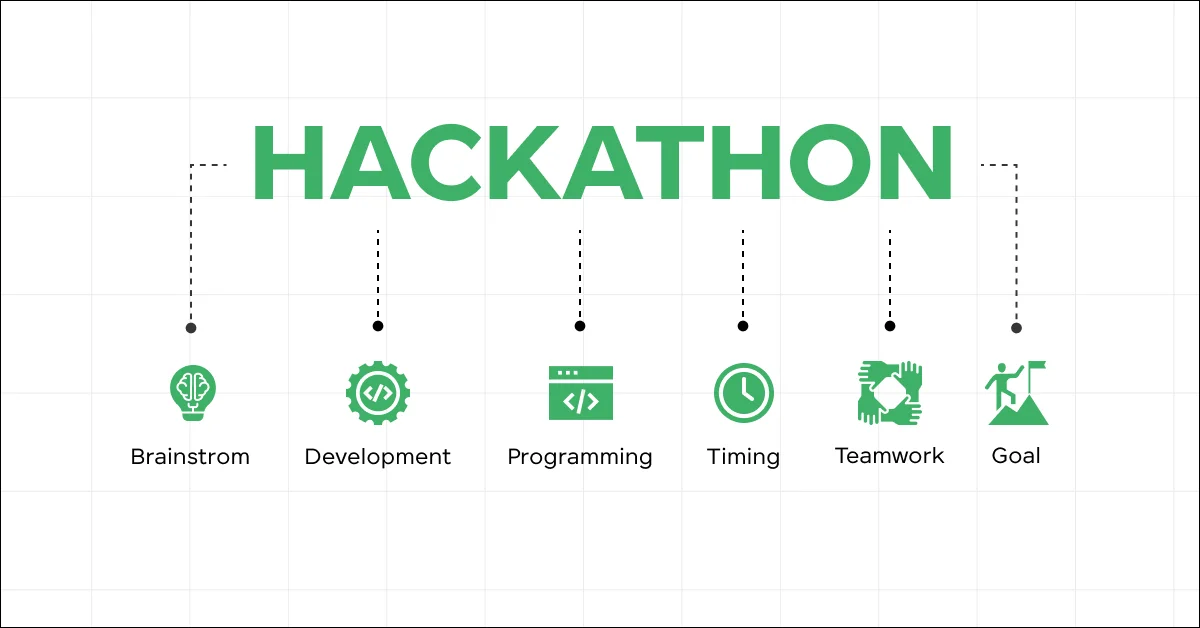
Before you prepare for Hackathons, you must understand what a Hackathon is, how it works, and what you’ll be doing in that. A hackathon is a collaborative event where you, along with other participants, come together to solve problems, create projects, and innovate, all within a limited timeframe.
Typically, hackathons last between 24 to 48 hours, but some can be shorter or longer. During this time, you’ll work in teams to develop a functional project, which can range from software applications and websites to hardware prototypes and data science solutions.
The primary goal of a hackathon is to build something impressive and functional within the given time. While the ultimate objective might vary, some hackathons focus on innovation, others on solving specific problems.
The core idea remains the same: collaboration, creativity, and rapid development. Let us understand how to prepare for Hackathons so that you’ll have an edge over the others.
Learn: Top 10 Coding Project Ideas for Beginners
Tips and Tricks to Prepare for Hackathons
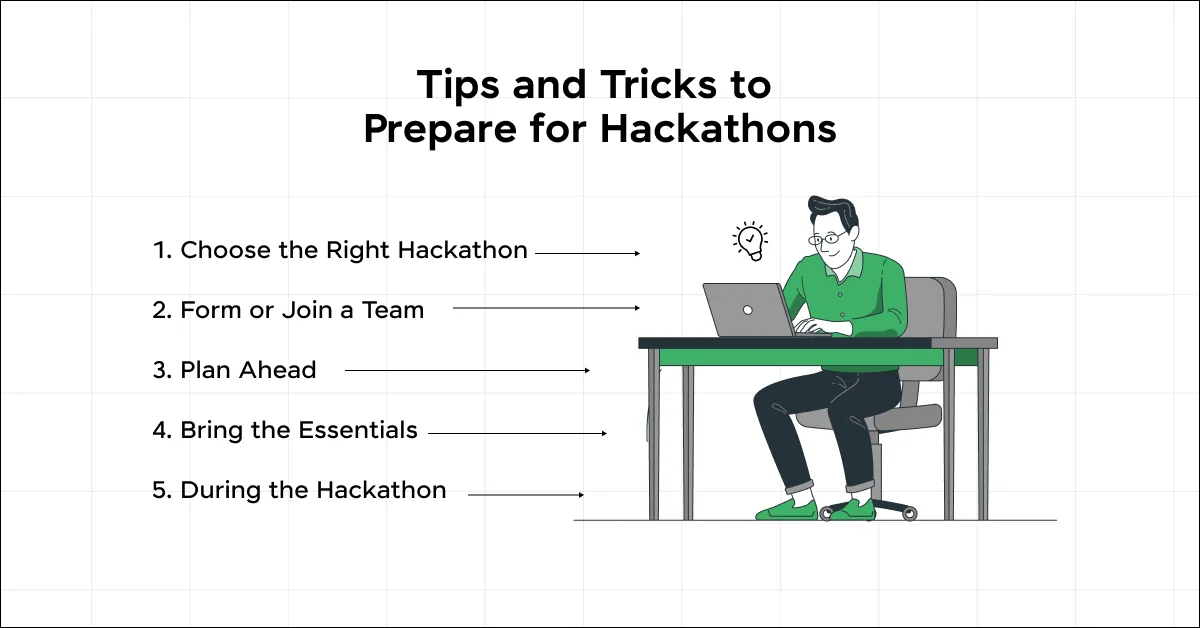
You must now understand what a Hackathon is and how it works. So, let us move on and address the topic of that day which is to learn the tips to prepare for Hackathons.
But before that, make sure you are thorough with the basics of full-stack development. If not, consider enrolling for a professionally certified online Full Stack Development course that would help you strengthen your basics along with an industry-grade certificate.
Let us see the tips and tricks to prepare for Hackathons:
1. Choose the Right Hackathon

Not all hackathons are the same and you cannot participate in everything that you see. They vary in themes, size, duration, and rules. This means that you have to incorporate different methods to prepare for Hackathons.
Here are some factors to consider when choosing your first hackathon:
- Theme: Select a hackathon with a theme that interests you, whether it’s healthcare, fintech, education, or a general tech challenge.
- Location: Decide if you prefer a local, in-person event or a global, online hackathon.
- Skill Level: Some hackathons cater to beginners, while others are more suited for experienced developers. Look for beginner-friendly events if you’re new to hackathons.
2. Form or Join a Team
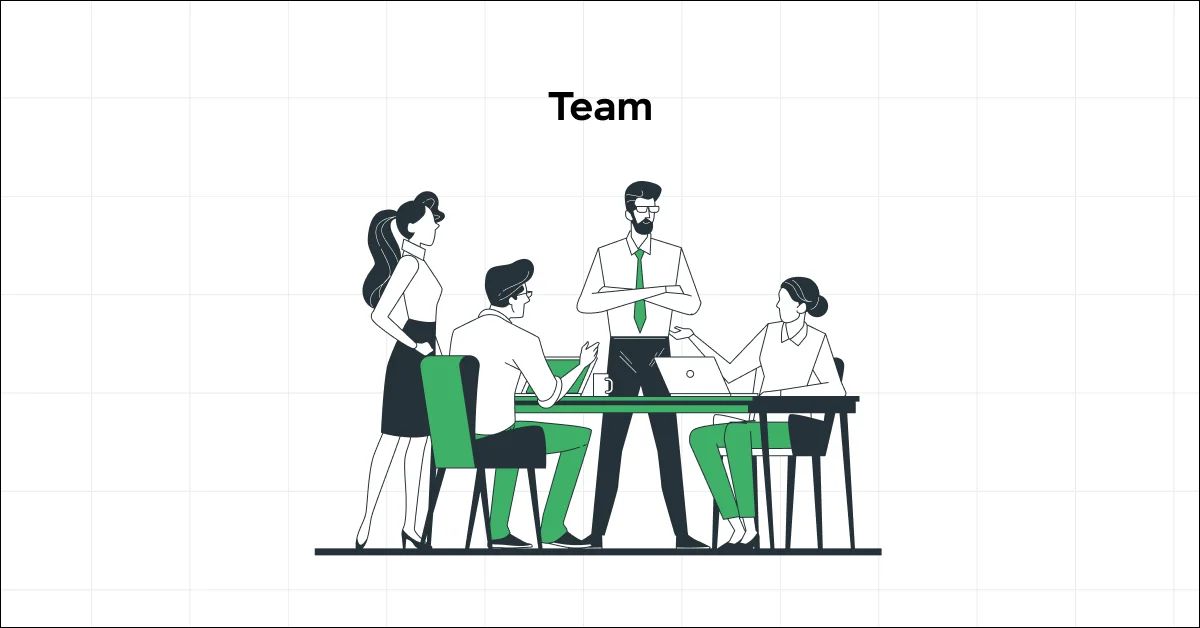
Teamwork is a crucial element and a must to prepare for hackathons. You can either form a team with friends or join one at the event. Here’s how to find the right team:
- Pre-Event Networking: Many hackathons have online platforms where participants can introduce themselves and form teams before the event.
- Diverse Skills: A well-rounded team includes members with diverse skills—developers, designers, marketers, and project managers.
- Complementary Strengths: Ensure that your team members have complementary strengths and can collaborate effectively.
Learn More: Full Stack Developer: Discover the Fastest Route to Becoming One
3. Plan Ahead
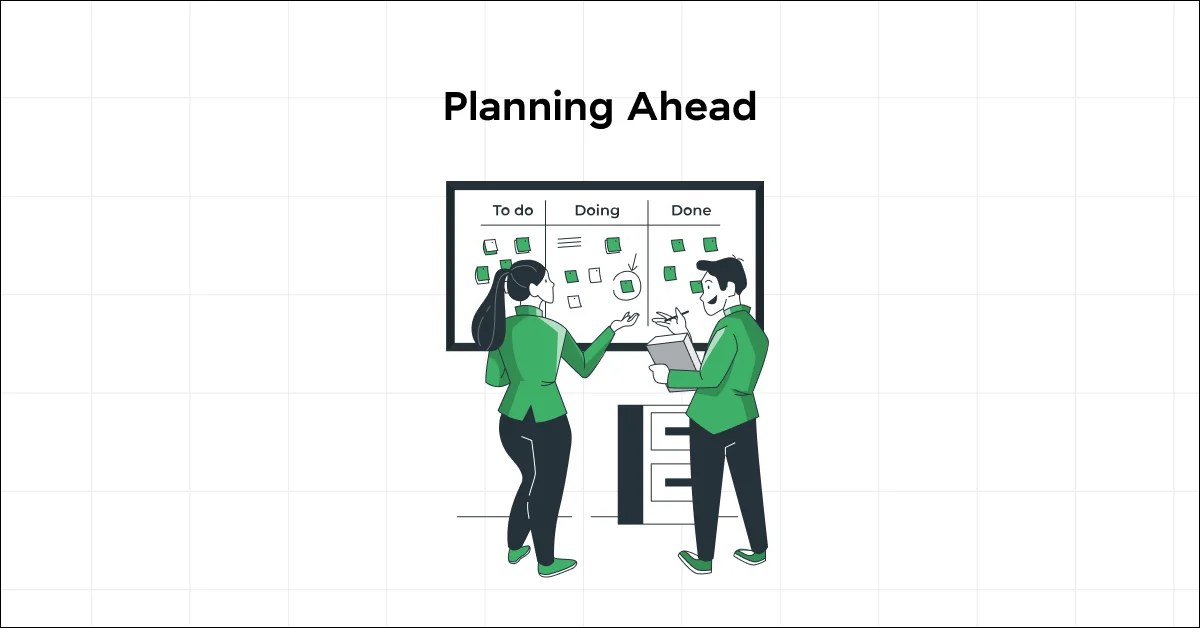
Preparation and planning ahead is key to making the most of your hackathon experience. By planning ahead, you can ensure that you prepare for Hackathons in the right way and that your team is organized, efficient, and ready to tackle challenges head-on.
Here’s a detailed guide on how to plan ahead and prepare for hackathons.
Research the Problem Statement
Many hackathons provide a problem statement or theme in advance. Take the time to understand it thoroughly.
- Understand the Challenge: Read the problem statement carefully and ensure you understand what’s being asked.
- Research: Conduct preliminary research on the topic. Look for existing solutions, technologies, and trends related to the problem.
- Brainstorm Solutions: Start brainstorming potential solutions. Think creatively and consider various approaches. Don’t be afraid to think outside the box and propose unconventional ideas.
Set Up Your Development Environment
Ensuring your development environment is ready before the hackathon can save you precious time during the event.
- Install Necessary Software: Make sure you have all the necessary software, libraries, and tools installed on your laptop. This includes IDEs, programming languages, frameworks, and any other tools you might need.
- Update Systems: Ensure your operating system and all essential software are up to date to avoid any unexpected issues.
- Test Your Setup: Run tests to ensure everything is working correctly. This step can help you catch and fix any problems before the hackathon starts.
Practice with Your Tools
Familiarity with the tools and technologies you’ll be using can significantly boost your productivity. This is important to do whenever you prepare for Hackathons.
- Coding Languages: Brush up on the programming languages you’ll be using.
- Frameworks and Libraries: Spend time learning the frameworks and libraries you plan to use.
- Version Control: Ensure you’re proficient with version control systems like Git. Practice common commands and workflows to streamline collaboration with your team.
Create a Project Plan
A well-thought-out project plan can guide your team’s efforts and keep everyone aligned.
- Define the Scope
- Assign Roles
- Set Milestones
Gather Essential Resources
Having all the necessary resources at your disposal can help you stay focused and productive during the hackathon. This includes:
- Documentation
- APIs and SDKs
- Design Assets
Planning ahead is crucial for a successful and enjoyable hackathon experience. Remember, the better you prepare for Hackathons, the more you can focus on creativity, collaboration, and innovation during the hackathon.
Explore: Mastering Advanced Git: An In-Depth Guide to Efficient Version Control
4. Bring the Essentials

Getting the right essentials can make a huge difference and is a crucial step when you prepare for Hackathons. Ensuring you have everything you need will help you stay focused, comfortable, and productive throughout the event.
Here’s a detailed guide on what to bring to your first hackathon.
- Laptop and Charger
- Notebook and Pen
- Snacks and Water
- Comfortable Clothing
- Sleeping Bag and Pillow
- Hygiene Essentials
- Emergency Kit
Bringing the right essentials to a hackathon can significantly enhance your experience and productivity. By doing this to prepare for Hackathons, you can focus on what truly matters. Remember, comfort and convenience are key to maintaining your energy and enthusiasm throughout the event.
5. During the Hackathon
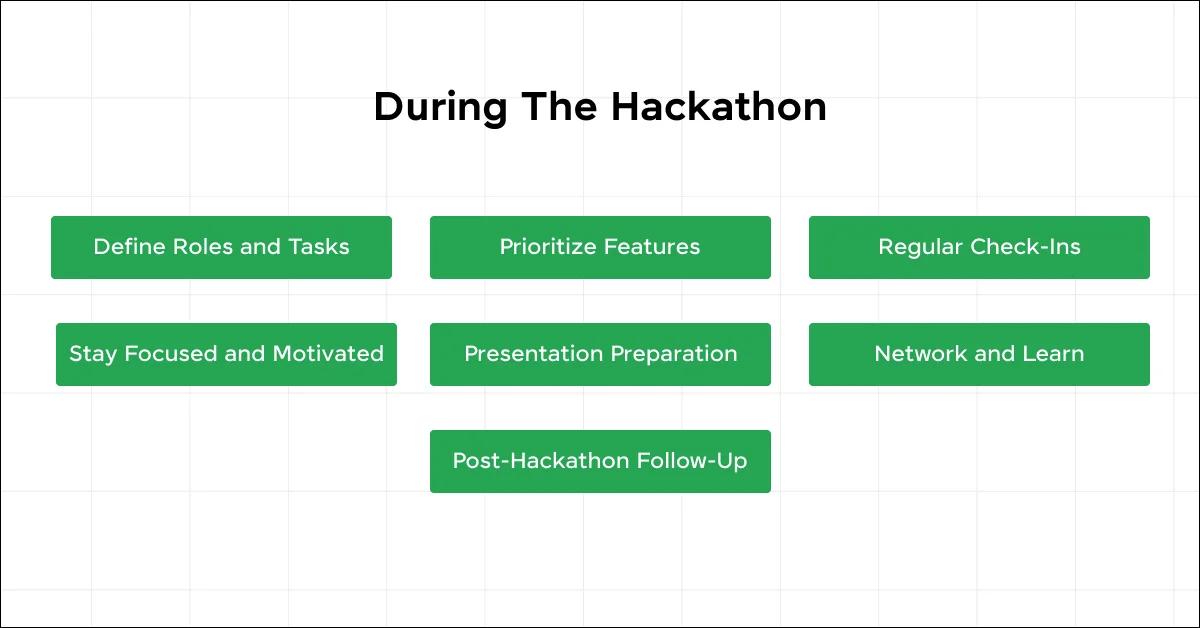
Till now, we have seen the pre-hackathon rituals that you need to prepare for Hackathons.
Once the hackathon begins, it’s all about effective teamwork, time management, and staying focused on your goals. So make sure that you follow everything beforehand when you prepare for Hackathons.
The hours will fly by, and maintaining productivity and motivation will be key to prepare for Hackathons and for your success.
Define Roles and Tasks
Clearly defining roles and tasks helps your team stay organized and efficient.
- Assign Roles: Based on each team member’s skills, assign specific roles such as project manager, developer, designer, and presenter.
- Task Breakdown: Break down the project into smaller, manageable tasks. Use a task management tool like Trello, Asana, or a simple shared document to assign and track these tasks.
- Milestones: Set milestones for critical points in your project. These milestones help keep the team focused and ensure steady progress.
Prioritize Features
With limited time, it’s crucial to focus on what’s essential. Prioritize the features that will make the biggest impact.
- Minimum Viable Product (MVP): Start by building a Minimum Viable Product that demonstrates the core functionality of your project. This approach ensures you have a working product to showcase, even if you run out of time.
- Feature List: Create a list of features ranked by importance. Focus on implementing the most critical features first, then move on to additional features if time permits.
- Flexibility: Be flexible and ready to adjust priorities as needed. If a particular feature is taking too long or proving too difficult, consider moving on to something more achievable.
Also Read: 10 Best React Project Ideas for Developers [with Source Code]
Regular Check-Ins
Frequent communication is important to ensure everyone is on the same page and to address any issues promptly.
- Daily Stand-Ups: Hold short, regular meetings to discuss progress, challenges, and next steps.
- Feedback Loop: Encourage open communication and feedback. If someone encounters a problem, the team can work together to find a solution quickly.
- Progress Updates: Regularly update your task management tool to reflect completed tasks and current progress.
Stay Focused and Motivated
Hackathons can be intense and exhausting, so staying focused and motivated is essential.
- Breaks: Take regular breaks to avoid burnout. Short breaks can help you recharge and return to your work with renewed energy.
- Healthy Habits: Maintain healthy habits by eating nutritious snacks, staying hydrated, and getting some rest if needed. Avoid excessive caffeine, which can lead to crashes.
- Positive Environment: Foster a positive and supportive team environment. Encourage each other, celebrate small victories, and keep the mood upbeat.
Presentation Preparation
Preparing for your presentation is crucial to showcase your hard work effectively.
- Craft Your Story: Develop a compelling narrative that explains the problem you’re solving, your solution, and its impact. Make sure it’s engaging and easy to understand.
- Demo Ready: Ensure your demo is polished and ready to present. Practice running through it multiple times to iron out any issues and to ensure a smooth delivery.
- Rehearse: Practice your presentation as a team. Focus on timing, clarity, and ensuring each team member knows their part. Be ready to answer questions from judges confidently.
Network and Learn
Hackathons are also about learning and networking, so make the most of these opportunities.
- Attend Workshops: Participate in any workshops or learning sessions offered during the hackathon. These can provide valuable insights and new skills.
- Network: Take the time to meet other participants, mentors, and sponsors. Building relationships can lead to future collaborations and opportunities.
- Ask for Feedback: Seek feedback on your project from mentors and peers. Constructive criticism can help you improve and learn for future hackathons.
Also Explore: Best Full-Stack Development Project Ideas in 2024
Post-Hackathon Follow-Up
The networking doesn’t end when the hackathon does. Here’s how to maintain and nurture the connections you’ve made:
- Connect on LinkedIn: After the hackathon, send LinkedIn connection requests to the people you’ve met. Personalize your requests with a message mentioning your interaction.
- Stay Engaged: Engage with your new connections by commenting on their posts, sharing relevant articles, and keeping them updated on your progress.
- Plan Future Collaborations: If you meet someone you’d like to work with again, discuss potential future projects or hackathons you can participate in together.
- Attend More Hackathons: Participate in more hackathons to continue building your network and learning new skills. The more events you attend, the more opportunities you’ll have to connect with like-minded individuals.
Learning and networking are fundamental components of preparing for hackathons. By embracing learning opportunities, actively engaging with other participants, and building relationships with industry professionals, you can maximize the benefits of the event.
If you want to learn more about projects and the basics of full-stack, then consider enrolling in
GUVI’s Certified Full-stack Development Program not only gives you theoretical knowledge but also practical knowledge with the help of real-world projects.
Also Read: Transitioning From Front End to Full Stack Development: A Guide for Developers
Conclusion
In conclusion, to prepare for Hackathons, you need to have an understanding of the event’s basics, choose the right hackathon, form or join a team, plan ahead, bring the essentials, and stay focused during the event.
By embracing learning opportunities and actively networking, you can make the most of your hackathon experience.
With this article, you can prepare for Hackathons in the right way and have a positive mindset to tackle any challenge and create something incredible.
Also Read: Mistakes to Avoid When Starting the First React Project
FAQs
No, hackathons are for all skill levels. Many events welcome beginners and provide resources and mentors to help you learn.
Yes, hackathons benefit from diverse teams, including designers, project managers, and marketers, alongside developers.
Prizes vary widely and can include cash awards, tech gadgets, internships, job offers, and opportunities to present your project to industry leaders.
Yes, hackathons are a great way to showcase practical experience and project-based learning on your resume, demonstrating your initiative and skills.





















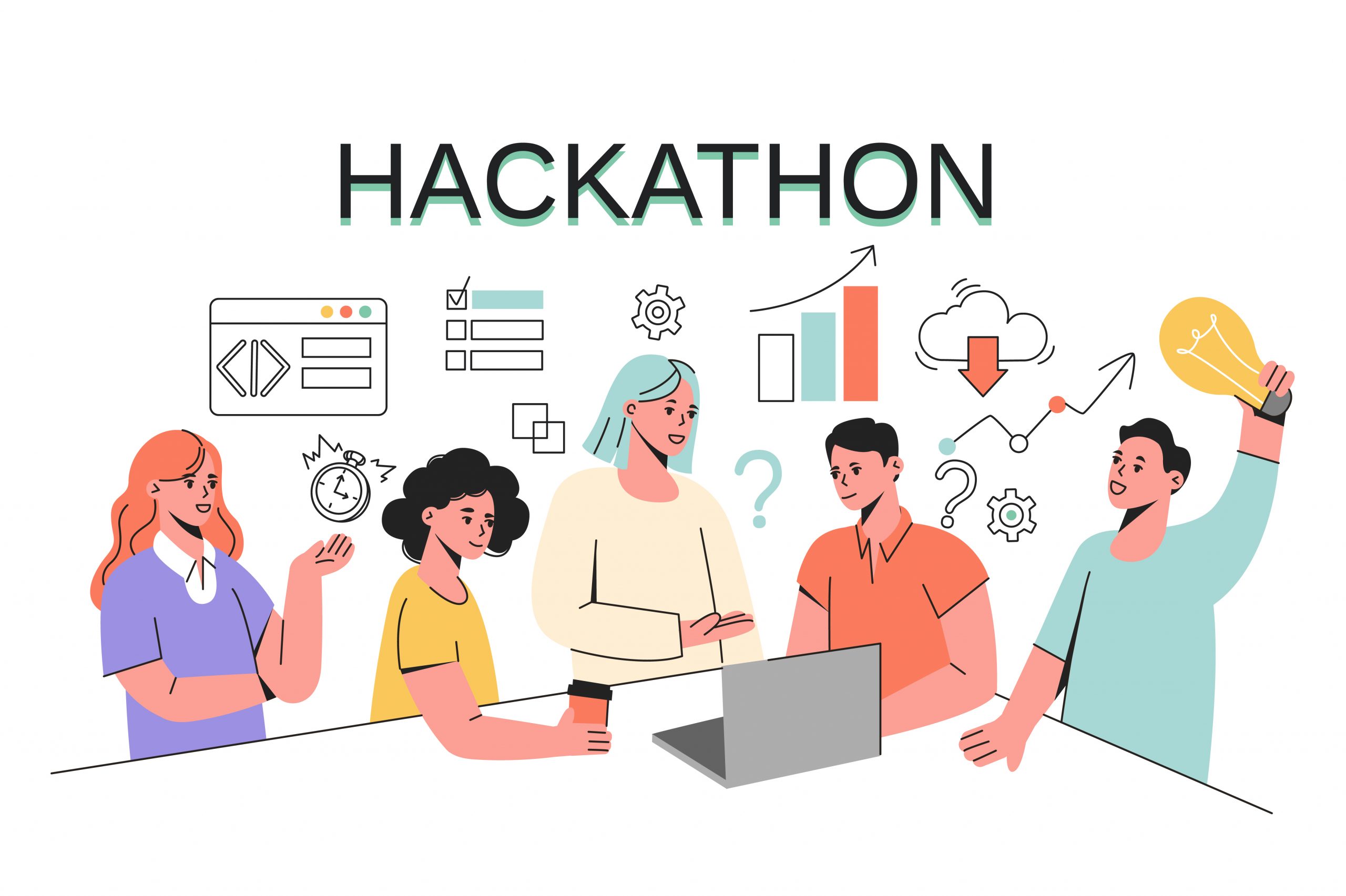
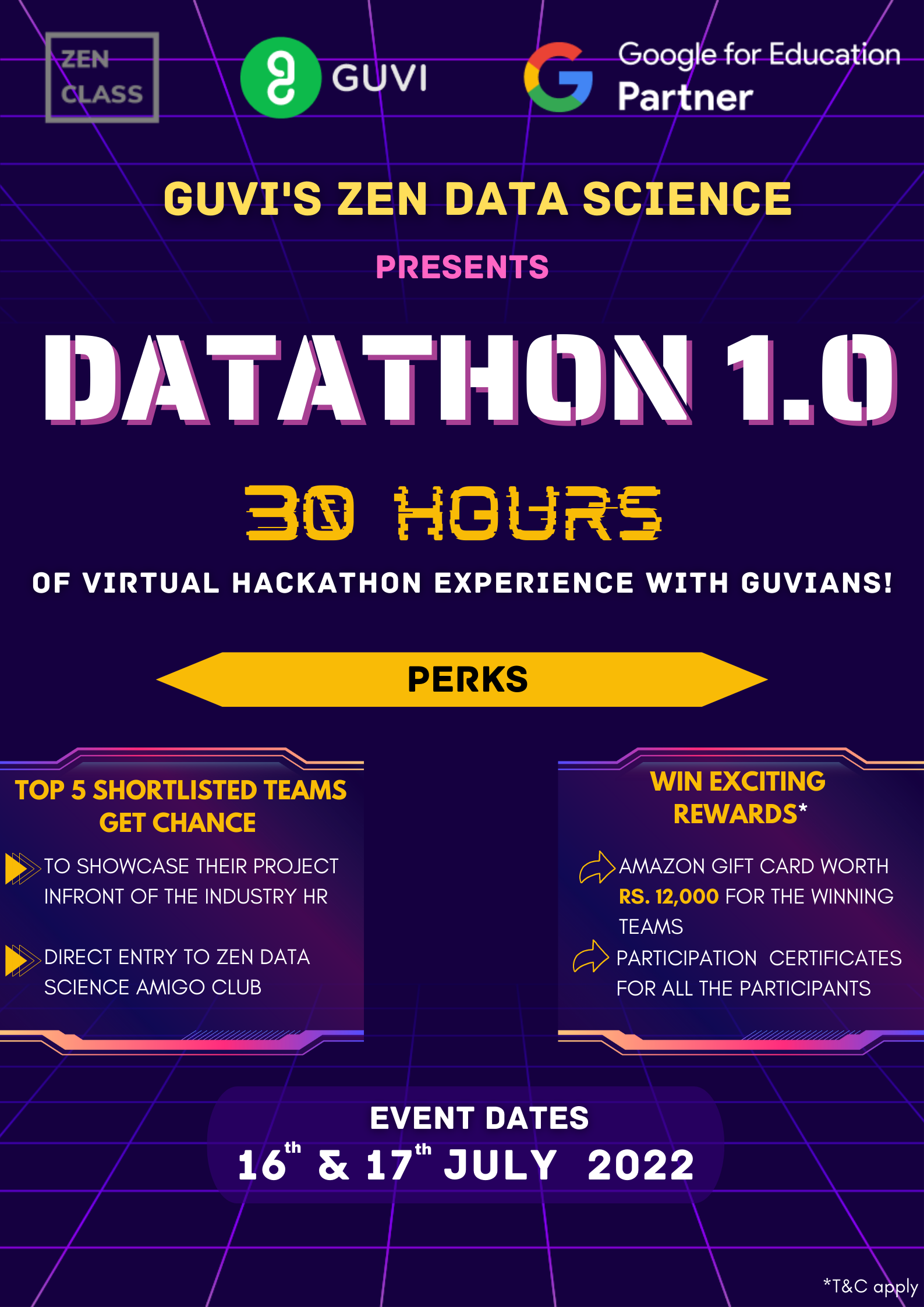

Did you enjoy this article?